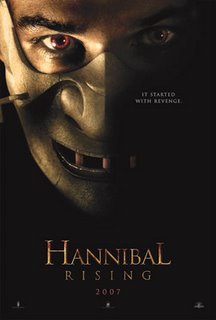
Hollywood seems to be obsessed with revealing the past and backgrounds of some of the film world's greatest villains. We got to see how Anakin Skywalker became Darth Vader. We got to see how Leatherface became the
Texas Chainsaw Massacre. There's even talk that in Rob Zombie's upcoming remake of
Halloween, we'll get to see more of Michael Myers' past, and how he came to be. (I sincerely hope this is not true. The character is supposed to be evil, plain and simple, and an origin would just be wrong.) Now, with
Hannibal Rising, we get to witness the early years of Dr. Hannibal Lecter. While the film does a good job of not overly humanizing the character, accidentally making him completely sympathetic to the audience, it does remove much of the mystery, and gives us a disappointingly simple revenge plot as an excuse to explain Lecter's actions in the later films. That's not to say
Rising does not have its entertainment value. Heck, compared to
Norbit, this movie's the pinnacle of filmmaking. Still, a character as interesting as Lecter deserves an equally interesting background, and it's here where things come up a bit short.

The story kicks off in 1944, with Hannibal as a young boy (Aaron Thomas) on the run with his family from the Nazis who are invading his home village. His parents are quickly dispatched, and it is eventually just him and his little sister, Mischa (Helena Lia Tachovska), trying to survive. A small band of Nazi soldiers, led by the cruel Vladis Grutas (Rhys Ifans) eventually show up at the childrens' hiding place, looking for shelter, and take the two hostage. Food eventually becomes scarce for the soldiers and they resort to cannibalism, taking young Mischa's life so that they can go on living. Flash forward eight years later, and a now teenaged Hannibal Lecter (played by French actor Gaspard Ulliel) is haunted by nightmares of his sister's death and fueled by thoughts of revenge. He escapes from the boarding school, and starts a new life with a Japanese relative named Lady Murasaki Shikibu (Gong Li from
Memoirs of a Geisha and last year's
Miami Vice movie). Murasaki is haunted by her own troubled past, losing her family during the bombings in Hiroshima, which sparks a mutual respect and love between the two. However, Hannibal's thoughts quickly go beyond simple pains from the past, and turn into a lust for revenge as he devotes his life to tracking down each of the men responsible for his sister's death, all of whom managed to escape being charged as war criminals, and are living comfortable lives in different parts of the world.
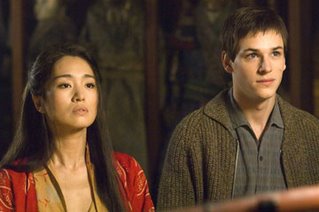
To its credit,
Hannibal Rising is careful not to portray its main character as a hero or to make him appear completely sympathetic and relatable. Though Lecter's desire to right the wrongs of his past is easily understandable, the movie is careful not to lose sight of the madness that lurks within him. He is capable of torturing others to get the information that he wants, he is often merciless, and he is not afraid to manipulate and use every method he can think of in order to get what he wants. In this regard, the film at least stays true to the character that Anthony Hopkins so famously portrayed in the three previous films. (Not counting 1986's
Manhunter, where the character of Lecter was portrayed by Brian Cox.) The movie is careful to stay within the established bounds of the character, and to not betray expectations. At the heart of the story is the performance by Gaspard Ulliel, who has been given the daunting task of stepping into Hopkins' shoes. He obviously tries his best, and at the very least, he doesn't try to do a direct imitation of the earlier performance. But something still seems missing. When he is toying with his enemies, or sarcastically taunting them as they struggle for life, he does not have the malicious glee that is needed. Yes, he smirks and whistles merrily as he seals their fate, but it still comes across as being somewhat hollow and empty because he seems to simply be playing and mugging for the camera, not actually feeling Lecter's sadistic glee. I would best describe Ulliel's performance as being not bad, considering the shadow of the previous actor he had to work under, but not nearly as good as it should have been.
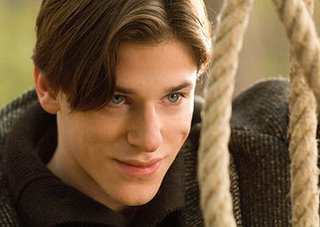
For a movie that is supposed to be about how Hannibal Lecter became the man we initially became intrigued with in
Silence of the Lambs, there is very little actual digging into the character of Lecter himself. That's because this movie is content to be a simple revenge story where the character hunts down his enemies until they are all dead, and then the credits roll. We seldom get to see anything about Lecter, aside from his desire for revenge. His relationship with Murasaki is not developed nearly as deep as I thought it should have been, and even his antagonistic relationship with the local police inspector investigating the series of murders (Dominic West) seems undernourished and forgettable. There's not enough story to hold up the film's two hour running time, and although the movie is never boring, we're never as engaged as we probably should be. A lot of this has to do with the screenplay by Hannibal's original author and creator, Thomas Harris. From the wooden and sometimes awkward dialogue ("Memories are like knives. They can hurt you".), to the sketchy characterizations, it often seems as if Harris' heart was not as much into this story as previous installments. He's not completely on autopilot mode, and gives us some choice moments and intriguing ideas. They just simply are not developed to the fullest. The story often seems to be in a rush, and simply skims over most of the details in order to keep the action moving somewhat. Every character in the movie exists simply to move the story along, and serve no other purpose but. Because of this, everyone comes across as a plot device, rather than an actual personality.
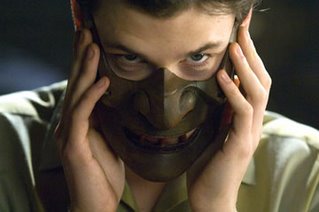
And yet, despite all this,
Hannibal Rising still manages to work on some basic level. The direction by Paul Webber (
Girl With a Pearl Earring) is attractive, using its European locales to the fullest. The performances, while not exactly great, certainly do not offend, and the actors do what they can with the material they have been given. Adding to this film's visual beauty is the cinematography by Ben Davis, who shoots the film in rich, dark colors that enhance the mood of every scene, so that the sequences never come across as overly dim or murky. The movie also seems much more in control of its depiction of violence than some of the earlier entries. The violence is often implied, rather than shown, and that is what makes it all the more chilling. We see Hannibal's blood-splattered face, but we do not see the actual death. That's not to say the movie completely plays it safe, as it does have more than its share of shock moments. It earns these moments of gore, as it never exploits of overexposes us to it, so the effect is not cheapened, nor does it become repetitive. The film is competently made all around, tightly edited, and certainly manages to keep our interest for the most part. If the storytelling and the script equaled the technical aspects, Hannibal Rising could have walked away with a very strong recommendation. Instead, it will have to settle for a mixed response.
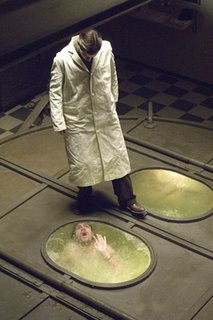 Hannibal Rising
Hannibal Rising is a strange film in the end. It engages, without actually digging deep enough into its story or characters. And despite the fact that the plotting is somewhat bare, it still manages to hold our interest. I still think the series could have done without a prequel, however. The movie lacks thrills, because we obviously know that Hannibal is going to make it out okay in the end. It kind of makes the life or death situation near the end nowhere near as thrilling as it's supposed to be, since the outcome is predetermined. This is a problem that many established stories face when they try to go backward, and
Hannibal can't help but fall into many of the same traps. At the very least, it manages to stay afloat just enough so that we don't regret seeing it. Those expecting more than that will most likely walk away disappointed.
0 comments
 Hollywood seems to be obsessed with revealing the past and backgrounds of some of the film world's greatest villains. We got to see how Anakin Skywalker became Darth Vader. We got to see how Leatherface became the Texas Chainsaw Massacre. There's even talk that in Rob Zombie's upcoming remake of Halloween, we'll get to see more of Michael Myers' past, and how he came to be. (I sincerely hope this is not true. The character is supposed to be evil, plain and simple, and an origin would just be wrong.) Now, with Hannibal Rising, we get to witness the early years of Dr. Hannibal Lecter. While the film does a good job of not overly humanizing the character, accidentally making him completely sympathetic to the audience, it does remove much of the mystery, and gives us a disappointingly simple revenge plot as an excuse to explain Lecter's actions in the later films. That's not to say Rising does not have its entertainment value. Heck, compared to Norbit, this movie's the pinnacle of filmmaking. Still, a character as interesting as Lecter deserves an equally interesting background, and it's here where things come up a bit short.
Hollywood seems to be obsessed with revealing the past and backgrounds of some of the film world's greatest villains. We got to see how Anakin Skywalker became Darth Vader. We got to see how Leatherface became the Texas Chainsaw Massacre. There's even talk that in Rob Zombie's upcoming remake of Halloween, we'll get to see more of Michael Myers' past, and how he came to be. (I sincerely hope this is not true. The character is supposed to be evil, plain and simple, and an origin would just be wrong.) Now, with Hannibal Rising, we get to witness the early years of Dr. Hannibal Lecter. While the film does a good job of not overly humanizing the character, accidentally making him completely sympathetic to the audience, it does remove much of the mystery, and gives us a disappointingly simple revenge plot as an excuse to explain Lecter's actions in the later films. That's not to say Rising does not have its entertainment value. Heck, compared to Norbit, this movie's the pinnacle of filmmaking. Still, a character as interesting as Lecter deserves an equally interesting background, and it's here where things come up a bit short. The story kicks off in 1944, with Hannibal as a young boy (Aaron Thomas) on the run with his family from the Nazis who are invading his home village. His parents are quickly dispatched, and it is eventually just him and his little sister, Mischa (Helena Lia Tachovska), trying to survive. A small band of Nazi soldiers, led by the cruel Vladis Grutas (Rhys Ifans) eventually show up at the childrens' hiding place, looking for shelter, and take the two hostage. Food eventually becomes scarce for the soldiers and they resort to cannibalism, taking young Mischa's life so that they can go on living. Flash forward eight years later, and a now teenaged Hannibal Lecter (played by French actor Gaspard Ulliel) is haunted by nightmares of his sister's death and fueled by thoughts of revenge. He escapes from the boarding school, and starts a new life with a Japanese relative named Lady Murasaki Shikibu (Gong Li from Memoirs of a Geisha and last year's Miami Vice movie). Murasaki is haunted by her own troubled past, losing her family during the bombings in Hiroshima, which sparks a mutual respect and love between the two. However, Hannibal's thoughts quickly go beyond simple pains from the past, and turn into a lust for revenge as he devotes his life to tracking down each of the men responsible for his sister's death, all of whom managed to escape being charged as war criminals, and are living comfortable lives in different parts of the world.
The story kicks off in 1944, with Hannibal as a young boy (Aaron Thomas) on the run with his family from the Nazis who are invading his home village. His parents are quickly dispatched, and it is eventually just him and his little sister, Mischa (Helena Lia Tachovska), trying to survive. A small band of Nazi soldiers, led by the cruel Vladis Grutas (Rhys Ifans) eventually show up at the childrens' hiding place, looking for shelter, and take the two hostage. Food eventually becomes scarce for the soldiers and they resort to cannibalism, taking young Mischa's life so that they can go on living. Flash forward eight years later, and a now teenaged Hannibal Lecter (played by French actor Gaspard Ulliel) is haunted by nightmares of his sister's death and fueled by thoughts of revenge. He escapes from the boarding school, and starts a new life with a Japanese relative named Lady Murasaki Shikibu (Gong Li from Memoirs of a Geisha and last year's Miami Vice movie). Murasaki is haunted by her own troubled past, losing her family during the bombings in Hiroshima, which sparks a mutual respect and love between the two. However, Hannibal's thoughts quickly go beyond simple pains from the past, and turn into a lust for revenge as he devotes his life to tracking down each of the men responsible for his sister's death, all of whom managed to escape being charged as war criminals, and are living comfortable lives in different parts of the world. To its credit, Hannibal Rising is careful not to portray its main character as a hero or to make him appear completely sympathetic and relatable. Though Lecter's desire to right the wrongs of his past is easily understandable, the movie is careful not to lose sight of the madness that lurks within him. He is capable of torturing others to get the information that he wants, he is often merciless, and he is not afraid to manipulate and use every method he can think of in order to get what he wants. In this regard, the film at least stays true to the character that Anthony Hopkins so famously portrayed in the three previous films. (Not counting 1986's Manhunter, where the character of Lecter was portrayed by Brian Cox.) The movie is careful to stay within the established bounds of the character, and to not betray expectations. At the heart of the story is the performance by Gaspard Ulliel, who has been given the daunting task of stepping into Hopkins' shoes. He obviously tries his best, and at the very least, he doesn't try to do a direct imitation of the earlier performance. But something still seems missing. When he is toying with his enemies, or sarcastically taunting them as they struggle for life, he does not have the malicious glee that is needed. Yes, he smirks and whistles merrily as he seals their fate, but it still comes across as being somewhat hollow and empty because he seems to simply be playing and mugging for the camera, not actually feeling Lecter's sadistic glee. I would best describe Ulliel's performance as being not bad, considering the shadow of the previous actor he had to work under, but not nearly as good as it should have been.
To its credit, Hannibal Rising is careful not to portray its main character as a hero or to make him appear completely sympathetic and relatable. Though Lecter's desire to right the wrongs of his past is easily understandable, the movie is careful not to lose sight of the madness that lurks within him. He is capable of torturing others to get the information that he wants, he is often merciless, and he is not afraid to manipulate and use every method he can think of in order to get what he wants. In this regard, the film at least stays true to the character that Anthony Hopkins so famously portrayed in the three previous films. (Not counting 1986's Manhunter, where the character of Lecter was portrayed by Brian Cox.) The movie is careful to stay within the established bounds of the character, and to not betray expectations. At the heart of the story is the performance by Gaspard Ulliel, who has been given the daunting task of stepping into Hopkins' shoes. He obviously tries his best, and at the very least, he doesn't try to do a direct imitation of the earlier performance. But something still seems missing. When he is toying with his enemies, or sarcastically taunting them as they struggle for life, he does not have the malicious glee that is needed. Yes, he smirks and whistles merrily as he seals their fate, but it still comes across as being somewhat hollow and empty because he seems to simply be playing and mugging for the camera, not actually feeling Lecter's sadistic glee. I would best describe Ulliel's performance as being not bad, considering the shadow of the previous actor he had to work under, but not nearly as good as it should have been. For a movie that is supposed to be about how Hannibal Lecter became the man we initially became intrigued with in Silence of the Lambs, there is very little actual digging into the character of Lecter himself. That's because this movie is content to be a simple revenge story where the character hunts down his enemies until they are all dead, and then the credits roll. We seldom get to see anything about Lecter, aside from his desire for revenge. His relationship with Murasaki is not developed nearly as deep as I thought it should have been, and even his antagonistic relationship with the local police inspector investigating the series of murders (Dominic West) seems undernourished and forgettable. There's not enough story to hold up the film's two hour running time, and although the movie is never boring, we're never as engaged as we probably should be. A lot of this has to do with the screenplay by Hannibal's original author and creator, Thomas Harris. From the wooden and sometimes awkward dialogue ("Memories are like knives. They can hurt you".), to the sketchy characterizations, it often seems as if Harris' heart was not as much into this story as previous installments. He's not completely on autopilot mode, and gives us some choice moments and intriguing ideas. They just simply are not developed to the fullest. The story often seems to be in a rush, and simply skims over most of the details in order to keep the action moving somewhat. Every character in the movie exists simply to move the story along, and serve no other purpose but. Because of this, everyone comes across as a plot device, rather than an actual personality.
For a movie that is supposed to be about how Hannibal Lecter became the man we initially became intrigued with in Silence of the Lambs, there is very little actual digging into the character of Lecter himself. That's because this movie is content to be a simple revenge story where the character hunts down his enemies until they are all dead, and then the credits roll. We seldom get to see anything about Lecter, aside from his desire for revenge. His relationship with Murasaki is not developed nearly as deep as I thought it should have been, and even his antagonistic relationship with the local police inspector investigating the series of murders (Dominic West) seems undernourished and forgettable. There's not enough story to hold up the film's two hour running time, and although the movie is never boring, we're never as engaged as we probably should be. A lot of this has to do with the screenplay by Hannibal's original author and creator, Thomas Harris. From the wooden and sometimes awkward dialogue ("Memories are like knives. They can hurt you".), to the sketchy characterizations, it often seems as if Harris' heart was not as much into this story as previous installments. He's not completely on autopilot mode, and gives us some choice moments and intriguing ideas. They just simply are not developed to the fullest. The story often seems to be in a rush, and simply skims over most of the details in order to keep the action moving somewhat. Every character in the movie exists simply to move the story along, and serve no other purpose but. Because of this, everyone comes across as a plot device, rather than an actual personality. And yet, despite all this, Hannibal Rising still manages to work on some basic level. The direction by Paul Webber (Girl With a Pearl Earring) is attractive, using its European locales to the fullest. The performances, while not exactly great, certainly do not offend, and the actors do what they can with the material they have been given. Adding to this film's visual beauty is the cinematography by Ben Davis, who shoots the film in rich, dark colors that enhance the mood of every scene, so that the sequences never come across as overly dim or murky. The movie also seems much more in control of its depiction of violence than some of the earlier entries. The violence is often implied, rather than shown, and that is what makes it all the more chilling. We see Hannibal's blood-splattered face, but we do not see the actual death. That's not to say the movie completely plays it safe, as it does have more than its share of shock moments. It earns these moments of gore, as it never exploits of overexposes us to it, so the effect is not cheapened, nor does it become repetitive. The film is competently made all around, tightly edited, and certainly manages to keep our interest for the most part. If the storytelling and the script equaled the technical aspects, Hannibal Rising could have walked away with a very strong recommendation. Instead, it will have to settle for a mixed response.
And yet, despite all this, Hannibal Rising still manages to work on some basic level. The direction by Paul Webber (Girl With a Pearl Earring) is attractive, using its European locales to the fullest. The performances, while not exactly great, certainly do not offend, and the actors do what they can with the material they have been given. Adding to this film's visual beauty is the cinematography by Ben Davis, who shoots the film in rich, dark colors that enhance the mood of every scene, so that the sequences never come across as overly dim or murky. The movie also seems much more in control of its depiction of violence than some of the earlier entries. The violence is often implied, rather than shown, and that is what makes it all the more chilling. We see Hannibal's blood-splattered face, but we do not see the actual death. That's not to say the movie completely plays it safe, as it does have more than its share of shock moments. It earns these moments of gore, as it never exploits of overexposes us to it, so the effect is not cheapened, nor does it become repetitive. The film is competently made all around, tightly edited, and certainly manages to keep our interest for the most part. If the storytelling and the script equaled the technical aspects, Hannibal Rising could have walked away with a very strong recommendation. Instead, it will have to settle for a mixed response. Hannibal Rising is a strange film in the end. It engages, without actually digging deep enough into its story or characters. And despite the fact that the plotting is somewhat bare, it still manages to hold our interest. I still think the series could have done without a prequel, however. The movie lacks thrills, because we obviously know that Hannibal is going to make it out okay in the end. It kind of makes the life or death situation near the end nowhere near as thrilling as it's supposed to be, since the outcome is predetermined. This is a problem that many established stories face when they try to go backward, and Hannibal can't help but fall into many of the same traps. At the very least, it manages to stay afloat just enough so that we don't regret seeing it. Those expecting more than that will most likely walk away disappointed.
Hannibal Rising is a strange film in the end. It engages, without actually digging deep enough into its story or characters. And despite the fact that the plotting is somewhat bare, it still manages to hold our interest. I still think the series could have done without a prequel, however. The movie lacks thrills, because we obviously know that Hannibal is going to make it out okay in the end. It kind of makes the life or death situation near the end nowhere near as thrilling as it's supposed to be, since the outcome is predetermined. This is a problem that many established stories face when they try to go backward, and Hannibal can't help but fall into many of the same traps. At the very least, it manages to stay afloat just enough so that we don't regret seeing it. Those expecting more than that will most likely walk away disappointed.






0 Comments:
Post a Comment
<< Home